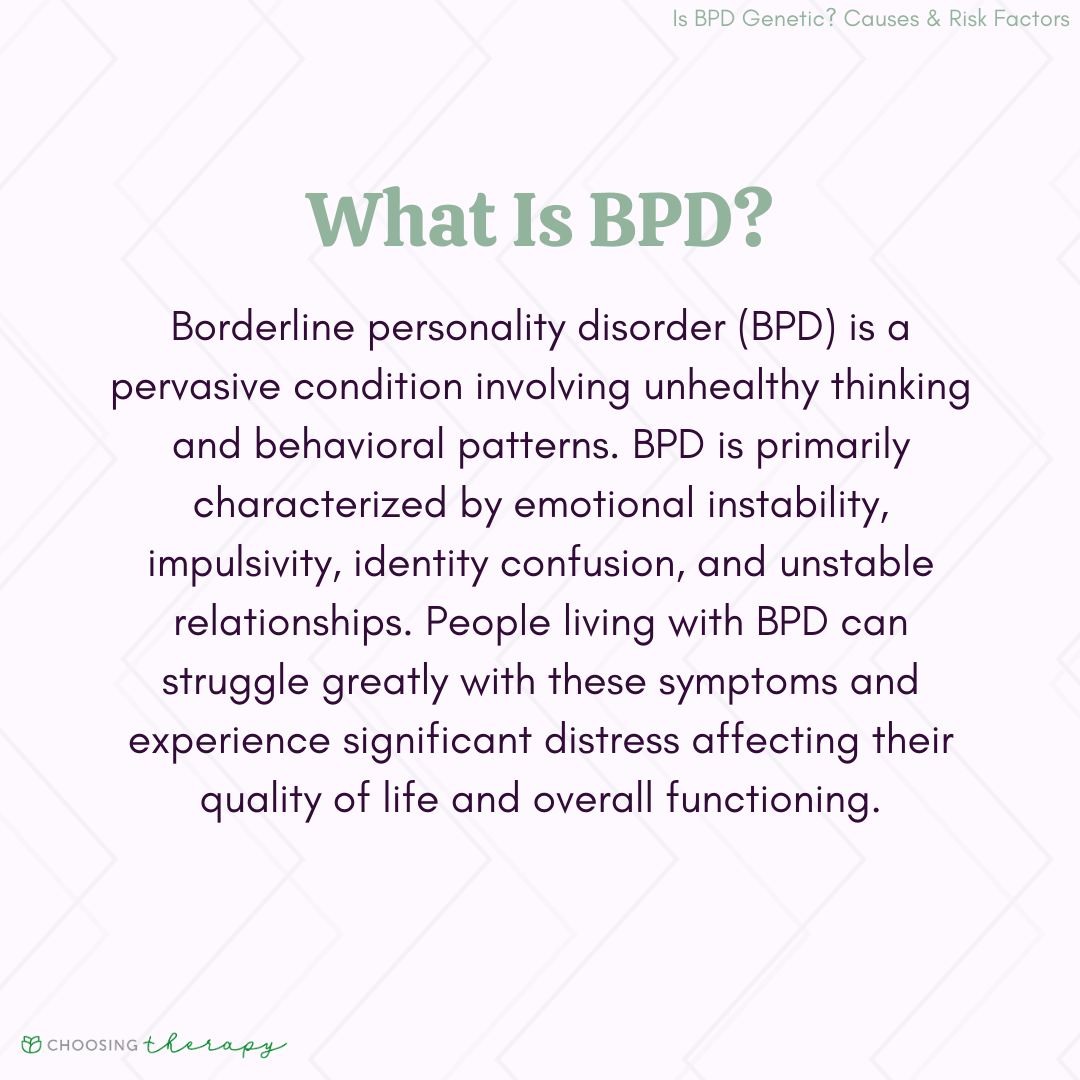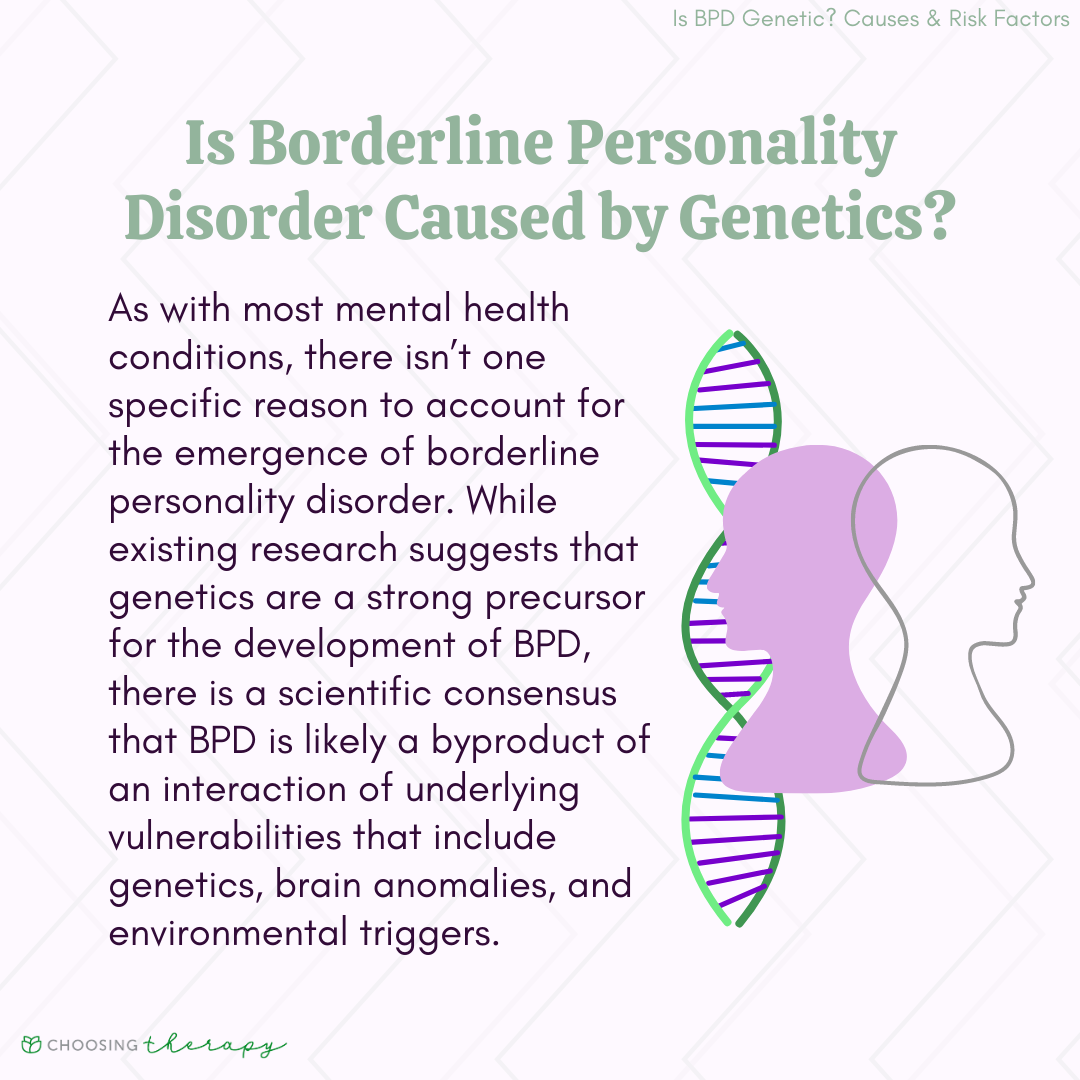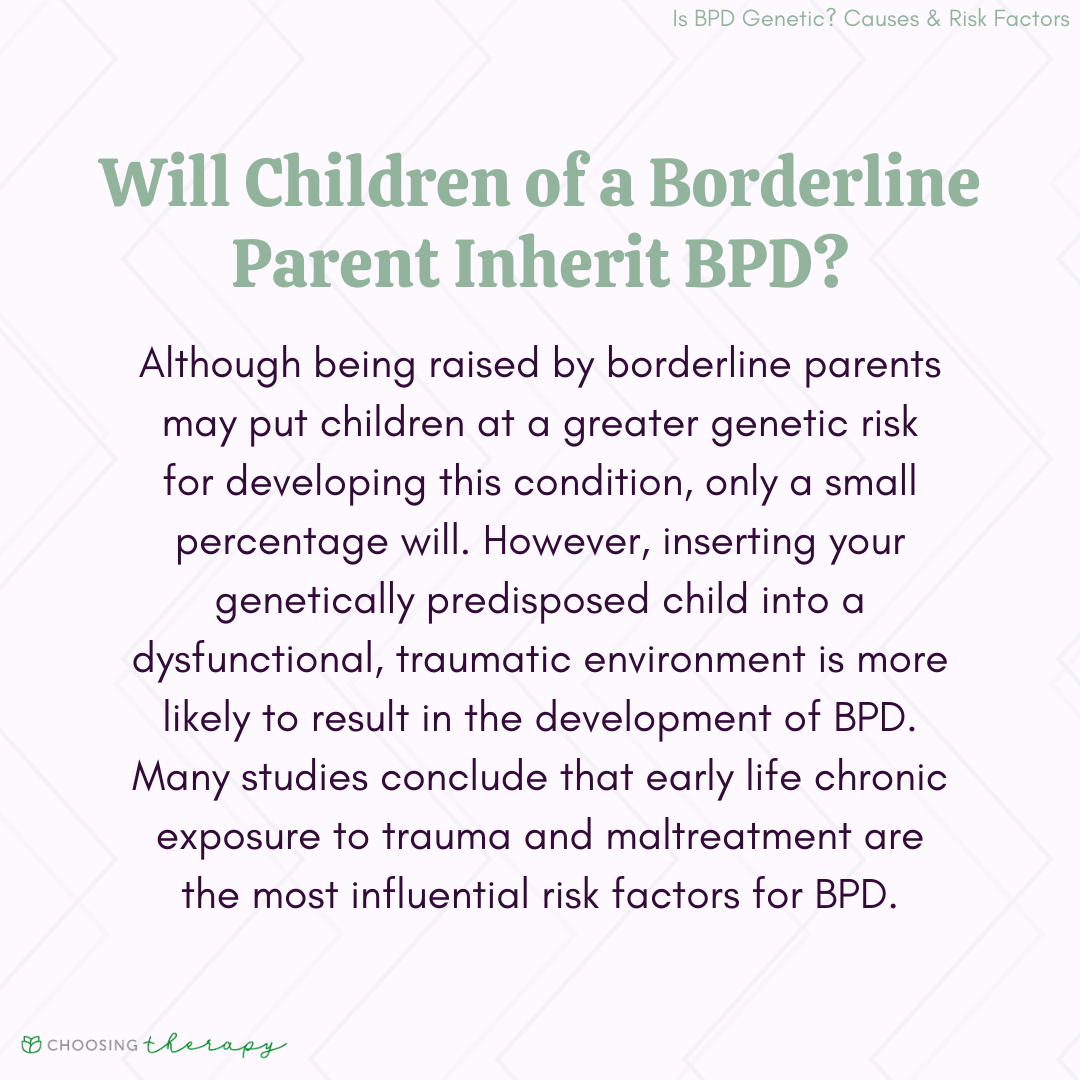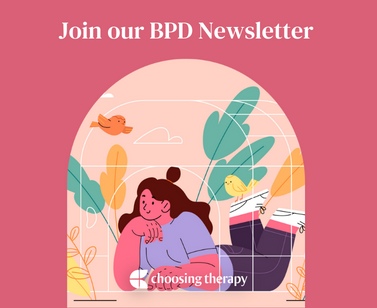Borderline personality disorder (BPD) is a psychiatric condition marked by persistent patterns of intense emotions and severe mood swings often resulting in impulsive behaviors and difficulty with interpersonal relationships. Precise causes for BPD are unclear; however, many experts agree that BPD emerges from a combination of genetics, biological factors, and early life adverse environmental influences.
Find a supportive therapist that can help with BPD.
BetterHelp has over 20,000 licensed therapists who provide convenient and affordable online therapy. BetterHelp starts at $65 per week. Take a Free Online Assessment and get matched with the right therapist for you.
What Is Borderline Personality Disorder?
Borderline personality disorder (BPD) is a pervasive condition involving unhealthy thinking and behavioral patterns. BPD is primarily characterized by emotional instability, impulsivity, identity confusion, and unstable relationships. People living with BPD can struggle greatly with these signs and symptoms and experience significant distress affecting their quality of life and overall functioning.1
Other signs and symptoms of BPD include:1
- Desperate attempts to avoid real or imagined abandonment
- A pattern of chaotic interactions in relationships that alternate between extremes of idealization and devaluation
- Persistent feelings of emptiness
- Unclear and inconsistent self-image or sense of identity
- Impulsivity in potentially self-destructive behaviors like drug abuse, binge eating, spending, reckless sex, dangerous driving, etc.
- Severe mood swings and extreme reactions to situational stress
- Recurrent self-harming behaviors and suicidal ideation, threats, or attempts
- Frequent inappropriate and unpredictable anger outbursts
- Transient, stress-related feelings of unreality, paranoia, or disconnection from the self
Is BPD Genetic?
While existing research suggests that borderline personality disorder does run in families, there is a scientific consensus that BPD is likely a byproduct of the interaction of underlying vulnerabilities that include genetics, brain anomalies, and environmental triggers.1,2,3
Family history is a compelling predictor for BPD. This personality disorder is about five times more common among first-generation biological relatives with BPD as compared to the general population. That means that people with a close family member like a sibling or parent with BPD have a higher probability of developing this mental illness. Additionally, BPD is generally more often diagnosed in females than males.
What Does it Mean For BPD to Hereditary?
The hereditary nature of borderline personality disorder refers to the transmission of certain qualities from one generation to the next. Parents pass on a combination of genes that influence how children look, behave, or whether they develop a type of illness. The closer you are in the family tree to the person with the condition, the more likely you are to get it.6
What Does Research Say About BPD & Genetics?
Although studies are scarce and outcomes vary, there is moderate evidence linking genetics with BPD. Most of these studies cannot conclusively determine if a genetic vulnerability is a cause, but a strong predictor of borderline personality disorder is due to genetics. The majority of scientific research is typically inclined toward the theory of “nature” vs. “nurture,” meaning BPD evolves from a combination of genetics and environmental influences.
Here are several examples of research on BPD and genetics:
- Early 2000’s twin studies: Two twin studies had moderate evidence for the genetic transmission and heritability of BPD. The findings revealed a higher rate of BPD between identical twins in comparison to fraternal twins. However, a third twin study indicated that environmental factors outweigh genetics in the development of BPD.2
- A 2014 scientific review: This review found genetic predisposition to be a strong underlying influence in the development of BPD. Nevertheless, it suggested that the onset of BPD was likely caused by a gene and environment interaction.4
- A 2019 twin study: Perhaps a more compelling comprehensive study in 2019 examined identical twins and concluded that BPD would have likely developed even if the identical twins were raised in different environments.5
Help For BPD
Talk Therapy – Get help living with Borderline Personality Disorder from a licensed therapist. Betterhelp offers online therapy starting at $65 per week. Free Assessment
BPD Treatment For Teens & Young Adults – Charlie Health’s virtual mental health program for young people (ages 11-33) includes curated peer groups, individual therapy, and family therapy for teens and young adults with serious mental health issues. Insurance accepted. Learn More
DBT Skills Course – DBT is a popular treatment for BPD. Learn DBT skills with live weekly classes and online video courses. Free Trial
Other Risk Factors for BPD
Note that while having one contributing element or a mixture of risk factors (genetics, environmental triggers, and brain anomalies) can increase the chances of developing BPD, it doesn’t necessarily mean you’re going to have it. Similarly, there are incidences where individuals who lack these predispositions still develop BPD in their lifespan.
Here are key components that factor into the development of BPD:
Problems With Brain Development
BPD can impact brain development, specifically the amygdala, hippocampus, and orbitofrontal cortex.
- The amygdala is central to emotional regulation and those with BPD have a compromised or underactive amygdala: This could be related to poor neurotransmitter communication in the brain, specifically serotonin which can result in poor emotional regulation.
- The hippocampus is central to behavioral regulation and impulse control: Those with BPD may have a smaller hippocampus and thus struggle more with these behaviors.
- The orbitofrontal cortex is central to decision making: Those with BPD may have a smaller cortex, and hence why these individuals struggle with decision making skills.
Environmental Factors
Genetic factors and a family history of BPD are relevant predisposition factors for a BPD diagnosis, but it doesn’t mean that you will absolutely develop BPD if someone in your family did. It is important to be aware of the environmental factors that can be just as critical for some.
Environmental factors that may trigger the onset of BPD symptoms include:
- Childhood abuse: Child abuse leaves the brain damaged in many ways as well as changes the natural trajectory of how the brain develops.
- Childhood trauma: Childhood trauma and trauma in general changes the brain as well, and changes how one may react to stressful situations.
- Parental rejection: This can be considered a type of abuse and/or neglect and rejection from caregivers can lead to personality issues later in life.
- Growing up in a toxic environment: An unstable and unsafe home environment leaves children more susceptible to mental health issues later in life.
Brain Chemical Imbalances
Alterations in certain neurotransmitters like serotonin have also been identified and linked with BPD. However, these findings are inconclusive in showing whether brain anomalies lead to BPD or if these occur because of the condition itself.
Borderline Personality Disorder Treatment
Seeking borderline personality disorder treatment is of utmost importance. It can help you develop the necessary skills for building a validating and stable family environment.7
Begin your recovery process by searching an online directory to find the right therapist who is experienced with personality disorders, uses evidenced-based techniques, and you can bond with. Evidence shows that psychotherapy is the most effective treatment path for those with BPD.
Treatment options for borderline personality disorder may include:
- Dialectical behavioral therapy (DBT): This therapy approach helps people understand and regulate their emotions.
- Cognitive behavioral therapy (CBT): This therapy approach helps people understand how their thoughts become behaviors and can help them change those thoughts for the better.
- Schema-focused therapy: This therapy approach focuses on modifying automatic thoughts and behaviors through role-playing.
- Mentalization-based therapy: This therapy approach unites thoughts and feelings and the impact on one’s actions.
- Medications: Medication for BPD can make a big difference in the lows and highs that come with BPD splitting as well as managing and regulating emotions.
Can BPD Be Passed Down to Children?
Although being raised by borderline parents may put children at a greater genetic risk for developing this condition, only a small percentage will. However, inserting your genetically predisposed child into a dysfunctional, traumatic environment will likely result in the development of BPD. Many studies conclude that early life chronic exposure to trauma and maltreatment are the most influential risk factors for BPD.1,2
Can Parents Prevent BPD?
As a parent with BPD, you may worry about how it could affect your parenting or passing on the disorder. Since the environment plays a significant role in your child’s development, you can put your worries to rest. There are many things you can do to create a nurturing, stable, safe, and validating atmosphere and reduce your child’s risk of developing BPD.
Take the following actions to create a healthy environment for your child:
- Reach out to an individual therapist: Individual therapy for children can make a big difference for the child and help them learn about their emotions, feel validated, and work through any barriers they have in functioning appropriately.
- Seek family therapy: Family therapy can help the whole family understand the diagnosis and learn how to work with it instead of against it.
- Join a parenting-focused support group: Parents who are going through similar things can find comfort in each other from a support group and can learn tips and tricks from other parents or just have a listening ear.
- Take a course on effective parenting skills: Learning how you can be a better parent is never a bad thing and will only help your child.
- Create a safe environment: Making all types of safety a priority in the home is key to ensuring that your child is feeling at ease and comfortable.
Final Thoughts
Borderline personality disorder has often been misunderstood and stigmatized. Luckily, decades of diligent research have advanced our understanding about this multifaceted disorder. As the research on BPD continues, more specific causes will likely be uncovered. This can pave the way for a more comprehensive level of care.
Additional Resources
Education is just the first step on our path to improved mental health and emotional wellness. To help our readers take the next step in their journey, Choosing Therapy has partnered with leaders in mental health and wellness. Choosing Therapy may be compensated for marketing by the companies mentioned below.
Talk Therapy
Online-Therapy.com Get support and guidance from a licensed therapist. Online-Therapy.com provides weekly video sessions and unlimited text messaging with your therapist for only $64/week. Get Started
BPD Treatment For Teens & Young Adults
Charlie Health’s virtual mental health program for young people (ages 11-33) includes curated peer groups, individual therapy, and family therapy for teens and young adults with serious mental health issues. Insurance accepted. Learn More
Free BPD Newsletter
A free newsletter from Choosing Therapy for those impacted by BPD. Get helpful tips and the latest information. Sign Up
DBT Skills Course
Jones Mindful Living Dialectical Behavior Therapy (DBT) is a popular treatment for BPD. Learn DBT skills with live weekly classes and online video courses for only $19 per month. Free One Week Trial
Choosing Therapy Directory
You can search for therapists by specialty, experience, insurance, or price, and location. Find a therapist today.

Best Online Therapy Services
There are a number of factors to consider when trying to determine which online therapy platform is going to be the best fit for you. It’s important to be mindful of what each platform costs, the services they provide you with, their providers’ training and level of expertise, and several other important criteria.
Find a therapist for personality disorders
Get the help you need from a therapist near you
City or zip Search








